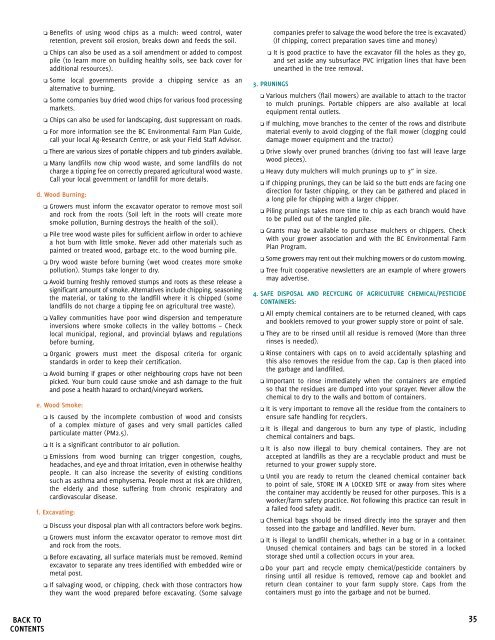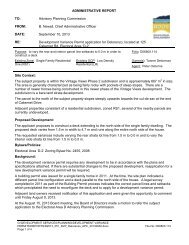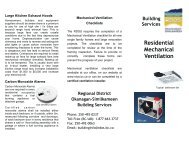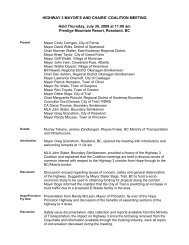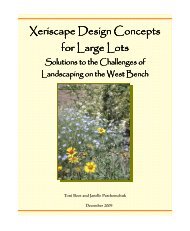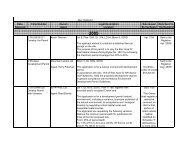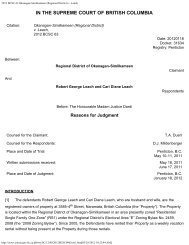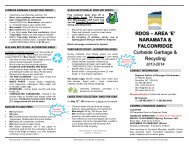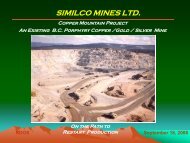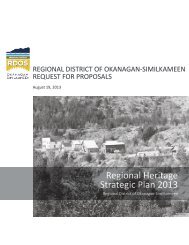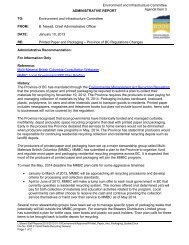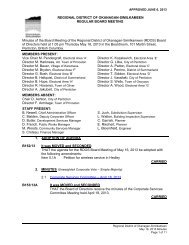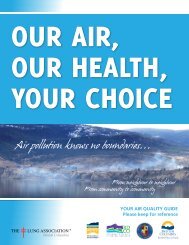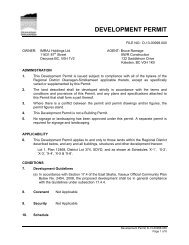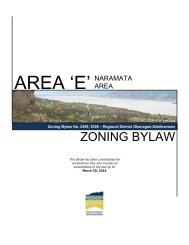Agricultural Waste Disposal - Agriculture
Agricultural Waste Disposal - Agriculture
Agricultural Waste Disposal - Agriculture
Create successful ePaper yourself
Turn your PDF publications into a flip-book with our unique Google optimized e-Paper software.
Benefits of using wood chips as a mulch: weed control, waterretention, prevent soil erosion, breaks down and feeds the soil. Chips can also be used as a soil amendment or added to compostpile (to learn more on building healthy soils, see back cover foradditional resources). Some local governments provide a chipping service as analternative to burning. Some companies buy dried wood chips for various food processingmarkets. Chips can also be used for landscaping, dust suppressant on roads. For more information see the BC Environmental Farm Plan Guide,call your local Ag-Research Centre, or ask your Field Staff Advisor. There are various sizes of portable chippers and tub grinders available. Many landfills now chip wood waste, and some landfills do notcharge a tipping fee on correctly prepared agricultural wood waste.Call your local government or landfill for more details.d. Wood Burning: Growers must inform the excavator operator to remove most soiland rock from the roots (Soil left in the roots will create moresmoke pollution, Burning destroys the health of the soil). Pile tree wood waste piles for sufficient airflow in order to achievea hot burn with little smoke. Never add other materials such aspainted or treated wood, garbage etc. to the wood burning pile. Dry wood waste before burning (wet wood creates more smokepollution). Stumps take longer to dry. Avoid burning freshly removed stumps and roots as these release asignificant amount of smoke. Alternatives include chipping, seasoningthe material, or taking to the landfill where it is chipped (somelandfills do not charge a tipping fee on agricultural tree waste). Valley communities have poor wind dispersion and temperatureinversions where smoke collects in the valley bottoms – Checklocal municipal, regional, and provincial bylaws and regulationsbefore burning. Organic growers must meet the disposal criteria for organicstandards in order to keep their certification. Avoid burning if grapes or other neighbouring crops have not beenpicked. Your burn could cause smoke and ash damage to the fruitand pose a health hazard to orchard/vineyard workers.e. Wood Smoke: Is caused by the incomplete combustion of wood and consistsof a complex mixture of gases and very small particles calledparticulate matter (PM2.5). It is a significant contributor to air pollution. Emissions from wood burning can trigger congestion, coughs,headaches, and eye and throat irritation, even in otherwise healthypeople. It can also increase the severity of existing conditionssuch as asthma and emphysema. People most at risk are children,the elderly and those suffering from chronic respiratory andcardiovascular disease.f. Excavating: Discuss your disposal plan with all contractors before work begins. Growers must inform the excavator operator to remove most dirtand rock from the roots. Before excavating, all surface materials must be removed. Remindexcavator to separate any trees identified with embedded wire ormetal post. If salvaging wood, or chipping, check with those contractors howthey want the wood prepared before excavating. (Some salvagecompanies prefer to salvage the wood before the tree is excavated)(If chipping, correct preparation saves time and money) It is good practice to have the excavator fill the holes as they go,and set aside any subsurface PVC irrigation lines that have beenunearthed in the tree removal.3. PRUNINGS Various mulchers (flail mowers) are available to attach to the tractorto mulch prunings. Portable chippers are also available at localequipment rental outlets. If mulching, move branches to the center of the rows and distributematerial evenly to avoid clogging of the flail mower (clogging coulddamage mower equipment and the tractor) Drive slowly over pruned branches (driving too fast will leave largewood pieces). Heavy duty mulchers will mulch prunings up to 3” in size. If chipping prunings, they can be laid so the butt ends are facing onedirection for faster chipping, or they can be gathered and placed ina long pile for chipping with a larger chipper. Piling prunings takes more time to chip as each branch would haveto be pulled out of the tangled pile. Grants may be available to purchase mulchers or chippers. Checkwith your grower association and with the BC Environmental FarmPlan Program. Some growers may rent out their mulching mowers or do custom mowing. Tree fruit cooperative newsletters are an example of where growersmay advertise.4.SAFE DISPOSAL AND RECYCLING OF AGRICULTURE CHEMICAL/PESTICIDECONTAINERS: All empty chemical containers are to be returned cleaned, with capsand booklets removed to your grower supply store or point of sale. They are to be rinsed until all residue is removed (More than threerinses is needed). Rinse containers with caps on to avoid accidentally splashing andthis also removes the residue from the cap. Cap is then placed intothe garbage and landfilled. Important to rinse immediately when the containers are emptiedso that the residues are dumped into your sprayer. Never allow thechemical to dry to the walls and bottom of containers. It is very important to remove all the residue from the containers toensure safe handling for recyclers. It is illegal and dangerous to burn any type of plastic, includingchemical containers and bags. It is also now illegal to bury chemical containers. They are notaccepted at landfills as they are a recyclable product and must bereturned to your grower supply store. Until you are ready to return the cleaned chemical container backto point of sale, STORE IN A LOCKED SITE or away from sites wherethe container may accidently be reused for other purposes. This is aworker/farm safety practice. Not following this practice can result ina failed food safety audit. Chemical bags should be rinsed directly into the sprayer and thentossed into the garbage and landfilled. Never burn. It is illegal to landfill chemicals, whether in a bag or in a container.Unused chemical containers and bags can be stored in a lockedstorage shed until a collection occurs in your area. Do your part and recycle empty chemical/pesticide containers byrinsing until all residue is removed, remove cap and booklet andreturn clean container to your farm supply store. Caps from thecontainers must go into the garbage and not be burned.BACK TOCONTENTS35


